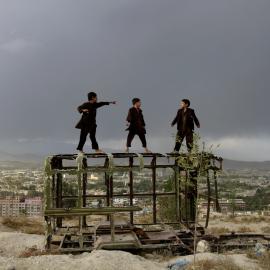To the Editor:
Arthur C. Helton's curious proposal ("Rescuing the Refugees," March/April 2002) to create an intergovernmental policy research center (hypothetically named Strategic and Humanitarian Action and Research, or SHARE) would not make a meaningful contribution in redressing the lack of coordination among humanitarian organizations, much less remedy most of the other deficiencies he laments.
It is overly ambitious, if not naive, to suggest that SHARE would improve crucial activities such as early warning or relief coordination by disseminating "bundled" information that is readily available to donors, UN agencies, and international organizations. Contrary to complementing coordination efforts, SHARE's experts would become yet another layer of intermediaries that would only complicate relief and development activities.
SHARE would also do little to improve efforts underway for years to synthesize "lessons learned" from past activities in Afghanistan and elsewhere. For example, the UN Office for the Coordination of Humanitarian Affairs published a report in 1996 highlighting successes and providing recommendations for more effective activities in Afghanistan. Likewise, the Danish government published a comprehensive report in 1999 itemizing the achievements and shortcomings of its activities in Afghanistan. An external evaluation commissioned by the U.S. Department of State in 1999 contained uncharacteristically blunt commentary about the strengths and weaknesses of U.S. relief and development practices (including annexes on Afghanistan, Sudan, and Kosovo), as well as of donor and operational coordination.
One key issue into which Helton should have delved more comprehensively is the conduct of international relief agencies and donors. All too often, poor coordination results when agencies' and donors' competing (or overlapping) agendas collide: turf battles emerge, agencies become defensive, and cooperation suffers. Unfortunately, even advice from experts cannot force these organizations to coordinate if they are unwilling.
Moreover, beneficiaries themselves can obstruct effective relief coordination. By inflating the number of persons in a family, withholding information about previously received assistance, or even selling relief supplies, beneficiaries can nullify coordination efforts and abuse donors' goodwill.
Helton has touched on some imperfections of international relief and development that need to be rectified. But the creation of SHARE is not the answer. Having fewer actors -- not more -- would be one step in the right direction.
Matthew S. Parry
New York City
To the Editor:
Arthur C. Helton correctly diagnoses the problems with the refugee assistance bureaucracies. For instance, there are too many of them, each with vague mission statements, insufficient funds for proactive contingency preparation, and different political constraints on who they may assist. But he only prescribes yet another bureaucratic intergovernmental policy research center, designed to collect and analyze information about emerging humanitarian crises. The disconnect between Helton's diagnosis of the problem and his tepid proposed solution is jarring.
Helton correctly points out the many constraints on how, when, and where agencies such as the UN High Commissioner for Refugees may take action. But if the logic of the diagnosis is followed, the solution to these problems is to remove constraints on action, not provide more information and analysis. Such a solution would include systematically combining relief and development programs and developing new international norms (and funding for them) that permit humanitarian agencies to react earlier and more independently. Such an approach inherently raises a host of difficult political issues about sovereignty, funding, and human rights -- but has little to do with a need for more information or an independent research institute. Indeed, there are a surfeit of sources in embassies, nongovernmental organizations, the UN, and the media generating information about emerging humanitarian crises everyday. The problem lies with the capacity of the international community to react, not with its analysis or information gathering.
The case of Afghanistan is a good example of a situation in which there was plenty of information and analysis, but too many bureaucratic restraints. The issues of land mines, infrastructure, political constraints placed on aid workers by the Taliban, and the lack of coordination within the donor community were all apparent years ago. None of these issues would be addressed by the new policy research center Helton proposes. Instead, they need to be addressed through systematic reform of existing agencies, with an eye to clarifying missions, aligning budgets with needs, and hiring for the problems found in potential crisis areas.
Tony Waters
Department of Sociology, California State University, Chico
